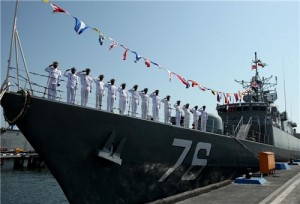 Iranian warships sailing toward U.S. borders would wind up in troubled waters if the U.S. Navy returns the threatening gestures it receives from Iran in the Persian Gulf, naval security experts say.
Iranian warships sailing toward U.S. borders would wind up in troubled waters if the U.S. Navy returns the threatening gestures it receives from Iran in the Persian Gulf, naval security experts say."When they cross into the North Atlantic, we'll start the harassment," says Chris Harmer, an analyst at the Institute for the Study of War who worked on military planning for the Persian Gulf as a commander in the U.S. Navy. "They do that to us every time we cross into the Strait of Hormuz."
Michael Connell, director of Iranian studies at the Center for Naval Analysis, which provides analysis to the U.S. government, says serious incidents between U.S. and Iranian ships happen about twice a year but that most interactions are routine.
"We'll probably track them, like they monitor us," Connell says. "We might send a Coast Guard cutter to keep an eye on them."
The commander of Iran's Northern Navy Fleet, Adm. Afshin Rezayee Haddad, told the official IRNA news agency that Iran was sending ships to the Atlantic Ocean to approach U.S. maritime borders for the first time. The U.S. maritime border is about 14 miles from land.
Iran has said it would embark on a cross-Atlantic voyage as a response to U.S. naval presence in the Persian Gulf. The Navy's 5th Fleet is based in Bahrain.
The Iranian ships are designed for smaller bodies of water and can motor for about a month without stopping. They will likely make multiple stops along the way, to refuel and replenish, rest and make headlines, Harmer says.
Unlike most commercial ships, warships are not required to deploy transponders, so their locations will show up only in the public eye when they make port calls, Harmer says. The first on the voyage is likely to be in South Africa, he says.
The United States, however, will use various means to track the ships' locations, with satellites, by monitoring electronic communications and, when the ships get closer, by aircraft and eyeballing them from passing U.S. vessels.
"We might have one of our ships do a drive-by on them, let them know 'We know you're here,' and drive on," Harmer says. "Between submarines, surface ships, patrol aircraft and satellites, we'll know where they are."
U.S. ships, including aircraft carrier groups, encounter aggressive treatment from Iran every time they enter the Gulf, which happens several times a year, Harmer says.
"They flash their lights at us, send their patrol boats in our direction," he says.
Occasionally, an Iranian patrol boat throws overboard a cardboard box painted black to resemble a mine, in the path of an American cruiser, he says.
"They also fly maritime patrol aircraft and buzz over our ships, yell at us over the radio," he says. "They'll say 'You have no right to be here. What's your manifest, what's your cargo?' It's low-level harassment. No one gets too worked up about it."
And Iranian oil rig helicopters flying to inspect oil rigs in the Gulf sometimes fly over American fleets, Harmer says.
The Navy in the Gulf returns the harassment, he says. "We'll fly our helicopters to escort their helicopters."
When Iranian patrol ships approach U.S. carriers or destroyers, U.S. helicopters hover over them or hover between them and U.S. ships, "shooting off flairs," as if to mark a line in the sea they should not cross, Harmer says.
"There's a lot of interaction between the U.S. Navy and Iranian ships to let the other team know we're here and we're capable," he says.
Whether the Iranian duo crossing the Atlantic with plans to approach within a few miles of the U.S. shores faces similar treatment is a decision that will be made at the highest levels of the U.S. government, Harmer says.
"Right now the United States is trying to deconflict with Iran," he says. "The U.S. is probably going to keep it pretty low-key at this point."
Whatever happens, the Iranians will probably remain quiet, Connell says.
"They don't want to court conflict with the U.S.," he says. "They're very vulnerable."
By USA Today
The Iran Project is not responsible for the content of quoted articles.










